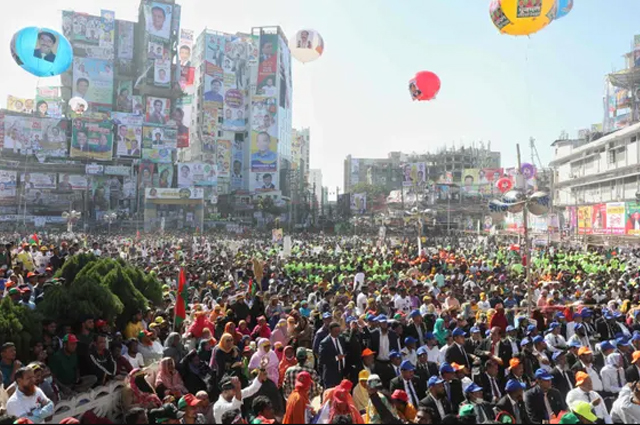Seven killed and thousands arrested as Hasina regime continues repressive campaign against opponents

Two top leaders of Bangladesh’s main opposition party have been arrested amid a violent crackdown on government opponents during which at least seven people have been shot dead and thousands arrested.
Over recent weeks, Sheikh Hasina’s government has launched a repressive campaign against the opposition Bangladesh Nationalist party (BNP), which has been holding rallies calling for her resignation.
The BNP has accused Hasina’s ruling Awami League of corruption, human rights abuses and the imposition of crippling fuel price rises. The BNP has organised an anti-government protest rally in the capital, Dhaka, which is expected to be attended by hundreds of thousands of supporters.
The BNP alleges that its leaders are being framed in fake cases in an attempt to stop the protest going ahead. In the early hours of Friday morning, the BNP’s general secretary, Mirza Fakhrul Islam Alamgir, and the BNP former minister Mirza Abbas were taken from their homes by police. The Dhaka Metropolitan police spokesperson Faruq Ahmed confirmed the leaders had been arrested on suspicion of instigating violence against police.
AKM Wahiduzzaman, the BNP leader, said: “The government has arrested the two senior leaders to keep them away from our Dhaka rally in a conspiracy to sabotage tomorrow’s programme. However, we will not backtrack from our plan and we will hold our planned rally in Dhaka tomorrow.”
It followed an incident on Wednesday when one person was killed and more than 60 injured after police fired live ammunition, rubber bullets and teargas on a BNP protest held outside the party offices in Dhaka. More than 400 BNP members and supporters were arrested at the demonstration.
The BNP is calling for Hasina to step down and for new elections to be held under a neutral caretaker government. Hasina, however, has refused and this week announced the next general election would take place in January 2024.
Wahiduzzaman said seven people had been shot dead and at least 6,000 BNP supporters had been arrested by authorities in recent weeks as the ruling party tried to contain a groundswell of opposition in the face of growing discontent over the economy and alleged corruption and abuses.
Yamini Mishra, Amnesty International’s regional director for South Asia, said in recent weeks there had been “an alarming escalation of repression by the authorities”.
Mishra said the police firing live ammunition on protesters “shows that the Bangladesh authorities have very little regard for the sanctity of human life and sends a chilling message that those who dare to exercise their human rights will face dire consequences”.
Both the 2014 and the 2018 general elections in Bangladesh were tainted by allegations of vote-rigging and the targeting of the political opposition, charges the Awami League deny. In recent months, the UN, the US and other countries have repeatedly urged the Bangladeshi government to hold a free, fair and all-inclusive election, but the crackdown on the BNP has continued unabated.
Since she came to power in 2009, Hasina’s government has been accused of gross human rights violations and an obliteration of the freedom of the press, with journalists and artists among those subjected to arbitrary detention for criticising the regime. In December 2021, the US imposed sanctions on Bangladesh’s special security force unit, the Rapid Action Battalion, which has been credibly implicated in extrajudicial killings, torture and enforced disappearances.
Several BNP leaders based in Dhaka declined to speak to the Guardian over fear of reprisal and arrest before Saturday’s protest.
Khalid Mahmud Chowdhury, a cabinet minister and leader from the Awami League, said the allegations of a crackdown were “not true at all”. Chowdhury claimed the police had fired on protesters only after the crowds had instigated violence.
“The BNP cadres are threatening to destabilise the country by creating chaos and indulging in violence,” he said. “So, against those unruly party activists, law enforcement agencies are taking actions that are legally justified. They are disobeying the rule of law so they are facing legal action.”
Chowdhury denied all allegations that the government had rigged elections or clamped down on freedom of the media. “People voted for our party overwhelmingly,” he said.
Mohammad Ashrafuzzaman, of the Hong Kong-based Asian Legal Resource Centre, said Hasina had created a “deepening constitutional, political, socioeconomic, and rule of law-related crisis in Bangladesh”.
He accused her of stripping Bangladeshis of their right to franchise and that after two allegedly rigged elections, people in Bangladesh were rising up in protest. “Having faced extreme forms of repressions, ordinary people are already outraged,” he said. “At any moment things may get out of control due to the brutal abuse of state machinery against the people. The only option left in Bangladesh is for Sheikh Hasina to step down without delay or face a people’s uprising.”
News Sources: www.theguardian.com

